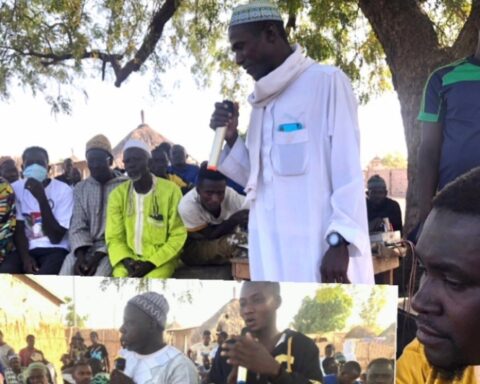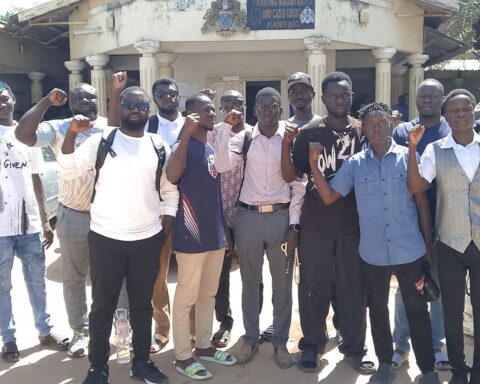Modou Jonga, an erstwhile Chief Executive Officer of the Brikama Area Council (BAC) on Wednesday, continued to face more questions about financial malpractices in the Council under his watch. It was his second day of appearance before the Local Government Commission of Inquiry. The Commission was set up to conduct full and impartial investigation into local government councils and related matters through holistic and fair review of the financial and administrative operations between May 2018 and January 2023.
Lead Counsel Patrick Gomez continued to confront the witness with audit queries and other information available to the question about the financial and administrative operations of the BAC. The witness, Modou Jonga, continues with his admissions to the wrongdoings and lack of adherence to transparency and accountability mechanisms enshrined the laws.
The laws governing the Councils are mainly the 1997 Constitution, the Local Government Act, the Local Government Finance and Audit Act, and the Financial Manual for Local Government Councils.
Jonga began his testimony on Wednesday by requesting more time to find the vouchers regarding some of the transactions that were queried by the auditors. The application for more time was granted.
The witness was able to provide the originals of his confirmation letter as the Chief Executive Officer of the Brikama Area Council. He also provided the updated Council’s Asset Register for 2022. He further provided a memo dated 28 October 2021 addressed to all departments and units’ heads concerning internal control measures. He provided one more memo.
He provided internal audit reports – one of the reports was dated 25 February 2022 on licence collections, and the other report was dated 30 December 2021 about “suspected revenue fraud.” He provided the approved procurement plan for 2021. All of them were tendered and admitted in evidence.
The Counsel proceeded to question the witness based on the 2022 Internal Audit (First Quarter) Report findings and queries.
The witness claimed that one of the memos he provided was his communication conveyed to all revenue collectors to deposit their collections in the bank and not to bring cash to the Council. He stated that he forbade them from giving cash to any person. The two memos he provided were reviewed by the Commission. He was asked to show where he gave the instructions. He could not. He requested time to go back to the Council to get the memo. He added that it was discussed in one of the management meetings.
He was told by Lead Counsel Gomez that one of the collectors, Lamin Saidy, claimed that he was not provided a cash book from 2016 to date. Saidy said the only cash book he had was purchased by him. The former CEO disputed that claim saying “that is not possible.” It is the testimony of Jonga that Lamin Saidy was provided a cash book.
“How are you going to collect without a cash book? That does not hold water” he said.
The witness said they have a CRBR record book where they keep records of the collectors who take receipt books. He added that he is not sure whether they have a record book to keep track of the collectors provided with cash books. He disputed Lamin Saidy’s claim saying that is not possible. He maintained that Lamin Saidy was provided with cash books and the Commission should not believe his testimony because it was not true.
He was questioned about revenue collectors, who allegedly suppressed council funds from their collections. The auditors said the amount of money suppressed by the collectors was huge. The witness was told that by allowing it to continue it affected the revenue of the Council. Each collector is required by law to deposit their daily collections, but most of them withhold substantial amounts of money. The witness tried to provide an excuse, but he was referred to his role as the Chief Executive Officer (CEO) under the law. He later said he was not aware of it. He was reminded of his role as the chief accounting officer of the Council, oversight over the units and staff, among others.
Section 202 of the Financial Manual details the functions of the CEO. He is responsible for the general management and supervision of the financial and administrative operations of the Council and the safeguarding of the Council’s assets. It stated that he is responsible for the due performance of the financial duties of the Council. He has the duty to ensure that adequate steps are taken for proper control of financial transactions under him. He is responsible for the general management, supervision, and production of the accounts of the Council.
“Everything starts and ends with you,” Counsel Gomez told the witness.
“Yes,” the witness answered.
“It was failure on your side as the CEO,” Gomez answered.
“It was my overall responsibility,” the witness answered.
“It is your primary responsibility,” Gomez said.
“Yes, sure,” the witness answered.
“The failure primarily is yours,” Gomez said.
“Yes, I agree,” the witness answered.
Counsel Gomez make reference to section 202 of the Financial Manual which provides that the Finance Director is answerable to the CEO in many areas, including the preparation of the monthly receipt and payment summary and bank reconciliation Gomez said if that was happening, it would have averted the financial problems in the Council. The witness was told he was responsible because he did not perform oversight over the Finance Director.
“I agree,” the witness said.
The CEO said he did not authorise any of the payments made directly from collections received by the revenue collectors without banking. He maintained that he had instructed all revenue collectors to deposit their collections in the bank.
The witness was confronted with the evidence of most of the collectors, who said they bring cash to the Council and give it to the Director of Finance and collect receipts from the Principal Cashier.
“These are issues I heard from the Commission. It was not brought to my attention,” the witness said.
“Failure to act is not an excuse,” Lead Counsel Gomez told the witness.
“Yes,” the witness answered.
The counsel read from a list containing the names of collectors, the number of months, years, and the amount of money they did not deposit in the account. Those collectors testified before the Commission with the claim that they gave the Director of Finance the money. The witness said he heard it from the Commission.
“You did not do what you were supposed to do to trace this,” Gomez said.
“Yes,” the witness answered.
The witness was also told some collectors have bank pay slips, but there are no records to show the details of their collections. The cash books were devoid of proper recordings. Some of the collectors do not record their collections for so many months, and for some, they did not record more than a year.
“Where you have senior management flouting the rules, there is a high likelihood that the junior officials and revenue collectors will also flout the rules,” Gomez said.
“Yes, it sends a bad signal,” the witness answered.
He was told over D197,000 was paid in March 2022 for the same maintenance of a vehicle within the space of two (2) days. The witness said it was not two payments for maintenance. Instead, the vehicle was taken for service, and that was paid for. While doing that, they discovered another problem. He said an invoice was sent for the second transaction, too. He added that he has both invoices in his laptop. He was instructed to provide the invoices and vouchers. The first problem was for maintenance, and the second was an issue of the clocking system of the vehicle, according to the witness.
The Counsel moved to the 2022 Second Quarter Internal Audit Report. There were issues of cash withholding amounting to D858,087 by some collectors. The ex-CEO said he wrote to each of the listed collectors to repay the money. He added that some of them were deducted from their salaries.
“Was this amount recovered?” Gomez asked.
“I will need to find out,” the ex-CEO replied.
The Commission noted that double filling was done on a vehicle BJL 2511 to Alagie Jeng for an amount of 40 litres on the same day for over D2000. Other Council staff were also allocated fuel on the same day. The witness said he needed time to find out.
The witness was asked about cash shortages of revenue collectors in the years he served as the CEO. He was asked what steps he took to ensure that the funds were accounted for. He testified that he did not take steps to account for the monies in the audit queries. He said it was a failure on his part.
He was also asked about the auction sales by the Council. The former CEO said he conducted two (2) auction sales. He was told that
D1.2 million is still unaccounted. The person implicated in the audit report was Lamin Suso, an-ex Finance Manager who served as the Cashier of the Auction Committee. The CEO requested 3 days to get the records and give the details of the auction. He claimed that the funds were deposited in the GTBank.
On the digital revenue collection device, the witness said there were some categories that were not collected using the machine.
The witness admitted that it was wrong for collectors to do the assessment and at the same time do the collection. He explained that there are possibilities of collusion. He testified that he had raised it in the Council, but the people had a different view.
He was told some of the collectors had suppressed cash.
“The scale of suppression of revenue was not done,” the witness answered.
The witness said he has never received a report indicating that some of the collectors suppressed revenue. He added that he heard of the suppression from the Commission.
“I am disappointed with the Internal Auditor,” he said.
He said the Internal Auditor failed to do his job diligently. He added that he should not have entertained a collector who does not provide deposit slips. He explained that the head of each of the units were obliged to provide performance reports of people under them, which they were not doing. He accepted responsibility for not performing oversight over the heads of departments and units.
The witness said he inherited several bank accounts from his predecessor: Eco Bank, Trust Bank, GT Bank, AGIB Bank, FIBank, Reliance Financial Service, Access Bank, and Zenith Bank.
“They were excessive. We should have a revenue account and a development account,” the witness said.
The witness was referred to the Local Government Finance and Audit Act requiring the councils to have development accounts. He read the provision of the law and then testified that they did not have a development account. Section 3 of the Local Government Finance and Audit Act provides that “A Council shall keep a Council Development Fund – (a) into which all revenue generated by the Council shall be deposited; and (b) from which all liabilities falling to be discharged by the Council shall be discharged.”
He indicated that a revenue account is important for the work of the councils as enshrined in the LG Finance and Audit Act mentioned above.
He was asked why they did not operate a revenue account. The witness admitted that it was a failure on his side.
He was asked about the revenue suppression of D62,000 by Yankuba Kujabi. The witness said there was a memo he circulated instructing collectors to deposit all their collections in the bank. He added that the memo forbade them from bringing cash to the Council. Lead Counsel Gomez told the witness that some of the revenue collectors used to bring cash in the Commission and hand it over to the Finance Unit. The witness said he heard of it during the testimonies of witnesses. He denied participating in that.
“There 3 be an emergency expenditure. I don’t have emergency expenditure in my vocabulary. I have zero tolerance to spending revenue collected directly from revenue collectors,” the witness said.
On the issue of Yankuba Kujabi who suppressed D62,000, he said he needed time to find out whether Kujabi paid the money or not. Yankuba Kujabi is the Market Master of the Council.
The testimony of the witness greatly focused on his role as the CEO in relation to what he did and his failures.







